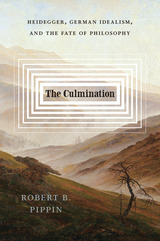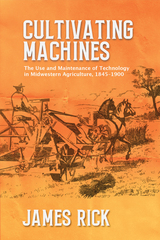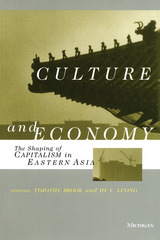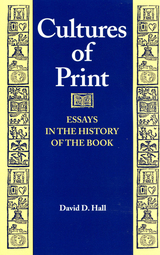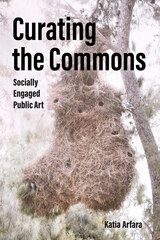2 books about Katz, Daniel
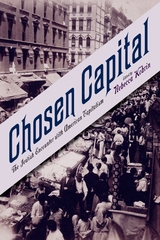
Chosen Capital
The Jewish Encounter with American Capitalism
Kobrin, Rebecca
Rutgers University Press, 2012
At which moments and in which ways did Jews play a central role in the development of American capitalism? Many popular writers address the intersection of Jews and capitalism, but few scholars, perhaps fearing this question’s anti-Semitic overtones, have pondered it openly. Chosen Capital represents the first historical collection devoted to this question in its analysis of the ways in which Jews in North America shaped and were shaped by America’s particular system of capitalism. Jews fundamentally molded aspects of the economy during the century when American capital was being redefined by industrialization, war, migration, and the emergence of the United States as a superpower.
Surveying such diverse topics as Jews’ participation in the real estate industry, the liquor industry, and the scrap metal industry, as well as Jewish political groups and unions bent on reforming American capital, such as the American Labor Party and the International Ladies’ Garment Workers’ Union, contributors to this volume provide a new prism through which to view the Jewish encounter with America. The volume also lays bare how American capitalism reshaped Judaism itself by encouraging the mass manufacturing and distribution of foods like matzah and the transformation of synagogue cantors into recording stars. These essays force us to rethink not only the role Jews played in American economic development but also how capitalism has shaped Jewish life and Judaism over the course of the twentieth century.
Contributors:
Marni Davis, Georgia State University
Phyllis Dillon, independent documentary producer, textile conservator, museum curator
Andrew Dolkart, Columbia University
Andrew Godley, Henley Business School, University of Reading
Jonathan Karp, executive director, American Jewish Historical Society
Daniel Katz, Empire State College, State University of New York
Ira Katznelson, Columbia University
David S. Koffman, New York University
Eli Lederhendler, Hebrew University, Jerusalem
Jonathan Z. S. Pollack, University of Wisconsin—Madison
Jonathan D. Sarma, Brandeis University
Jeffrey Shandler, Rutgers University
Daniel Soyer, Fordham University
Surveying such diverse topics as Jews’ participation in the real estate industry, the liquor industry, and the scrap metal industry, as well as Jewish political groups and unions bent on reforming American capital, such as the American Labor Party and the International Ladies’ Garment Workers’ Union, contributors to this volume provide a new prism through which to view the Jewish encounter with America. The volume also lays bare how American capitalism reshaped Judaism itself by encouraging the mass manufacturing and distribution of foods like matzah and the transformation of synagogue cantors into recording stars. These essays force us to rethink not only the role Jews played in American economic development but also how capitalism has shaped Jewish life and Judaism over the course of the twentieth century.
Contributors:
Marni Davis, Georgia State University
Phyllis Dillon, independent documentary producer, textile conservator, museum curator
Andrew Dolkart, Columbia University
Andrew Godley, Henley Business School, University of Reading
Jonathan Karp, executive director, American Jewish Historical Society
Daniel Katz, Empire State College, State University of New York
Ira Katznelson, Columbia University
David S. Koffman, New York University
Eli Lederhendler, Hebrew University, Jerusalem
Jonathan Z. S. Pollack, University of Wisconsin—Madison
Jonathan D. Sarma, Brandeis University
Jeffrey Shandler, Rutgers University
Daniel Soyer, Fordham University
[more]
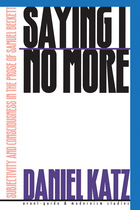
Saying I No More
Subjectivity and Consciousness in the Prose of Samuel Beckett
Daniel Katz
Northwestern University Press, 1999
In recent criticism, Samuel Beckett's prose has been increasingly described as a labor of refusal: not only of what traditionally has made possible narrative and the novel but also of the major conventional suppositions concerning the primacy of consciousness, subjectivity, and expression for the artistic act. Beginning from the premise that Beckett never betrays his belief in "the impossibility to express," Saying I No More explores the Beckettian refusal. Katz posits that the expression of voicelessness in Beckett is not silence, that the negativity and negation so evident in the great writer's work are not simply affirmed, but that the valorization of abnegation, emptiness, impotence, or the "no" can all too easily become itself an affirmation of power or an inverted imposition of force.
[more]
READERS
Browse our collection.
PUBLISHERS
See BiblioVault's publisher services.
STUDENT SERVICES
Files for college accessibility offices.
UChicago Accessibility Resources
home | accessibility | search | about | contact us
BiblioVault ® 2001 - 2025
The University of Chicago Press


